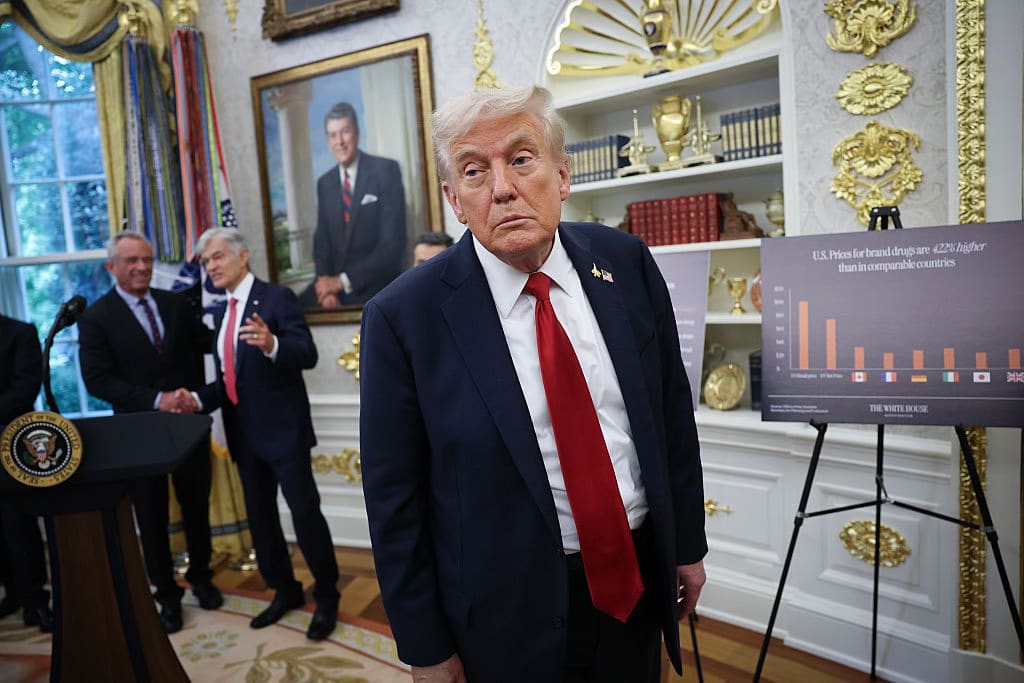Trump could score $3.5 billion from Truth Social going public. But tapping the money may be tricky.
Former President Donald Trump could soon receive a windfall valued as much as $3.5 billion, with shareholders of a publicly traded funding partner on Friday approving a merger with his Trump Media & Technology Group.
The approval occurred Friday morning, according to a livestream of the shareholder vote. Shares of Digital World Acquisition Corp., a so-called "blank check" company that will now merge with Trump's media group, jumped 5.5% in morning trading.
With Digital World Acquisition Corp. (DWAC) shareholders' approval of the deal, the businesses could soon combine, putting the former president's Truth Social social media platform on the stock market. Trump created Truth Social as a conservative-focused social media service after he was banned from Twitter, now known as X, and other platforms following the January 6th riot.
Digital World is a special purpose acquisition company, or SPAC, a shell company that is created to take a private business public without conducting an initial public offering.
The new company will be renamed Trump Media & Technology Group Corp. and trade under the stock ticker DJT, the same letters as Trump's initials, according to regulatory filings.
Trump stands to make a fortune from the pending deal, given that he will control 78.8 million shares of the newly merged company, or about 58% of the business. Based on DWAC's current stock price, that stake could be worth as much as $3.5 billion.
Some of DWAC's shareholders appear to be Trump followers, as one group on Truth Social includes more than 7,850 users who have been communicating about the stock and its prospects. That raises the possibility that DWAC's shares are currently getting a lift from Trump's supporters at a time when Trump is moving closer to securing the GOP nomination for president.
That windfall could land in Trump's lap at a time when his financial pressures are ratcheting up. For one, Trump's lawyers have said he's been unable to secure a bond to appeal a judgement of more than $460 million in his civil fraud case. If he can't pony up the money by March 25, New York state could seize property from Trump to satisfy the ruling.
Trump is also facing hefty legal bills in the other court cases against him, including more than $8.5 million in legal expenses so far in 2024 alone. His political action committees last year spent more than it raised, partly due to almost $50 million in legal fees for the president's ongoing legal defenses.
But while a $3.5 billion stake in a publicly traded company could help relieve some of those financial pressures, it's unlikely to immediately help Trump. That's because he and other big shareholders are subject to a so-called "lock-up" provision that bars him from selling his stock for at least six months.
Here's what to know.
Why can't Trump immediately sell his stake in Trump Media?
That's due to a lock-up provision for major shareholders, according to a DWAC regulatory filing.
Lock-up provisions are a common restriction on Wall Street designed to keep big investors from dumping their shares in a company soon after the company goes public. If they were to occur, such large stock sales could cause a company's shares to tank.
Trump likely won't be able to use the stock to get a loan, either. That's because the DWAC regulatory filing states that founding investors can't sell, lend, donate or encumber their shares for six months after the deal closes.
Legal experts say "encumber" is a powerful word that could prevent Trump from using the stock as collateral to raise cash before six months have elapsed.
Could Trump sell before the lock-up expires?
It's possible that Digital World could waive the lock-up agreement before the deal closes. Or, in what some legal experts say would be a more likely path, the new company's board could decide to alter the lock-up agreement after the deal closes.
Such a decision by the new board could open those directors up to legal scrutiny, however. They would need to show they're doing it to benefit shareholders.
Could Trump sell his stock after the six months are over?
Yes, but typically major shareholders don't sell their entire stake in one sale. That's because such a big transaction could undermine other investors' faith in the stability of the company as well as flood the market with available shares, potentially leading to a plunge in the company's share price.
Major stockholders and company founders usually sell their shares in smaller amounts over time to avoid destabilizing the stock price.
Is Trump's stake really worth $3.5 billion?
That figure is based on the current trading price of DWAC and the number of shares that Trump will own after the merger closes.
But any publicly traded investment comes with risks, including the possibility that the shares could lose value. Once publicly traded, the Trump Media Group could face more scrutiny from a wider pool of investors, who might not see the same value in it as DWAC's current shareholder base.
"In the short term, if a lot of people say, 'I don't really care what it's worth, I'm just gonna keep buying it, and I'm gonna keep propping it up,' you can do that for a reasonable period of time," said Harry Kraemer, a professor specializing mergers and acquisitions at Northwestern University's Kellogg School of Management. That "almost defies economic logic, but there we are," he added.
For one, the Trump Media Group's main asset is Truth Social, which is lagging far behind rival social media platforms such as Facebook, X and Instagram in both users and advertisers. Truth Social is filled with advertisements for faux-medical cures, Trump-themed merchandise and right-wing companies.
Trump Media booked $3.7 million in revenue in the first nine months of 2023 and "expects to incur significant losses into the foreseeable future," according to a regulatory filing. Unless it can rapidly boost its revenue or turn a profit, it could have difficulty maintaining its lofty valuation, experts said.
"Given the fact that their sales last year were less than $5 million, and they're losing significant money, it is hard to believe that the long-term economic value of this company could even be as high as $100 million," Kraemer said. "So talking about billions is absolutely ridiculous from an economic standpoint."
Again, Trump also faces risks if he sells stock once the lock-up provision is expired. For instance, if he sells a large stake, the value of the stock could decline, which would then lower the value of his remaining shares at a time when he may need more money to pay legal bills or fund his campaign.
"As soon as people know he's gonna sell the stock, they're gonna want to sell the stock, and the stock is going to crater," Kraemer predicted.
The Associated Press contributed to this report.






